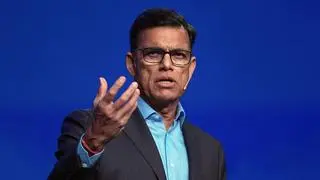The year 2020 was one of contrasts. Even as the world experienced one of its worst recessions and health crises, India also saw its best bull market.
The strategies adopted by the richest and the second richest Indians were also a story of contrasts. While the richest — Mukesh Ambani — went on a deleveraging exercise to ensure his company reached a zero net debt status, even giving up stakes in the group’s future facing businesses of technology and retail, the second richest — Gautam Adani — embarked on a debt-fuelled expansion spree.
So much so that the Adani group’s mounting debt load (see table) has set off alarm bells.
The group’s Gross Debt/EBITDA was at 6.06x and Net Debt/EBITDA was at 5.35x as of December 2020. Interest coverage ratio was around 1 or below 1 for all listed companies in the group except Adani Ports & Sez (APSEZ) and Adani Total Gas. Most businesses would be uncomfortable with such metrics.
Two years ago, there were reports that Adani Power was likely to approach the National Company Law Tribunal to seek bankruptcy protection for its subsidiary Adani Power Mundra. Despite this brush with bankruptcy, the group’s growth ambitions have not reduced.
Expanding unchecked
In January 2020, the Adani group struck a ₹13,500-crore deal for a 75 per cent stake in the Krishnapatnam Port. It announced a takeover of Dighi Port for ₹650 crore and acquisition of Alipurduar Transmission in a ₹1,300-crore deal. Not satiated, the group also announced a mega plan to buy a majority stake in Mumbai and Navi Mumbai Airports that industry sources say would set it back by ₹15,000 crore.
During the course of the year, it also landed a contract for the world’s largest solar project entailing investments of ₹45,000 crore and approved a plan for delisting debt-laden Adani Power for ₹3,000 crore.
Will the group be able to execute all these large contracts given its high leverage?
So far, the markets have not reflected any concern. In the last one year all stocks in the Group except for Adani Power have yielded positive returns. Investors in the other Adani Group stocks pocketed handsome returns ranging from 60 per cent (APSEZ) to 400 per cent (Adani Green). In contrast, Reliance Industries with its mega capital raise delivered only 40 per cent returns in the same period.
Neither do the debt markets seem concerned. A recent $300-million debt issue of a joint venture of APSEZ was oversubscribed 10 times. The weak link in the group is Adani Power and that needs to be addressed, says Lavina Quadros, Equity Analyst at Jefferies India. The group, she says, is taking steps to ensure that stronger companies such as APSEZ are not impacted by the leverage profile of weaker companies. APSEZ had said it would not extend inter-corporate deposits to Adani Power, and so far had stuck to its commitment, she adds.

Will it sustain?
The markets seem confident about the group. But in 2015/16 Reliance Power and Reliance Infra had similar leverage metrics and enjoyed market confidence yet derailed when group firm Reliance Communication plummeted.
Another point of concern is that the sectors it is expanding into — Airports and Data Centres — are high leverage businesses where history is not encouraging. GMR and GVK groups, which won prized airport privatisation contracts in 2005, did not recover from their debt fuelled expansion. Tulip Telecom went into oblivion under the weight of debt to build Asia’s largest data centre in Bengaluru.
While the Adani Group, given its scale and history of good execution, may spring a surprise, attempting this with a better leverage profile may have been better.
What can be done?
What is baffling is that with a group market capitalisation at around ₹5.04 trillion and high promoter stake in most companies at around 75 per cent (except APSEZ — 64 per cent and Adani Total Gas — 37 per cent), why the promoters have not diluted stake. Majority control in Adani Enterprises, Adani Power and Adani Transmission can be maintained with even up to a 50 per cent stake sale. Ditto with a 25 per cent stake sale in Adani Ports and Sez. A 15 per cent stake sale across group companies would bring group Net Debt/EBITDA to a comfortable 2.5x.
There has been a deal to sell a 20 per cent stake in Adani Green Energy to French Oil Major Total SA, but it appears to be greatly undervalued. Total is paying $2.5 billion for a combination of a 20 per cent stake in Adani Green (current market valuations peg its worth at $4.5 billion) and a 50 per cent stake in an Adani Green subsidiary. Does this mean market valuations for group companies are excessive? Is that why the group has not considered stake sales to reduce debt?
During last week’s earnings call, Adani Enterprises said they were comfortable with the current leverage and did not expect their Debt/Ebitda to exceed their internal target of 5.5x. Conventional wisdom would indicate even a target of 5.5x represents excess leverage. The company maintains its current Debt/EBITDA is around 4x — based on internal estimates, not actuals.
Ambani was not comfortable with a net debt of ₹1.6 trillion when EBITDA was just above ₹1 trillion in FY20. This was after he was mostly done with his expansion and capex. The Adani group, with a lot of capex ahead, is apparently comfortable with a net debt at 75 per cent of what RIL had in FY20 with EBITDA at less than 25 per cent of RIL. Is Gautam Adani overconfident or holding his cards close to his chest?








Comments
Comments have to be in English, and in full sentences. They cannot be abusive or personal. Please abide by our community guidelines for posting your comments.
We have migrated to a new commenting platform. If you are already a registered user of TheHindu Businessline and logged in, you may continue to engage with our articles. If you do not have an account please register and login to post comments. Users can access their older comments by logging into their accounts on Vuukle.